

This Is Your Brain on Writing. The Anosognosic's Dilemma: Something's Wrong but You'll Never Know What It Is (Part 1) Dunning-Kruger Effect: When Distorted Self-Perception and Illusions of Competence Trick Entertainers, Politicians, and Cities. American Idol (Photo credit: Wikipedia) Steve Mensing, Editor ♦While many have not heard of the Dunning-Kruger Effect, no doubt more than a few of us have watched those shows starting a new season of American Idol.
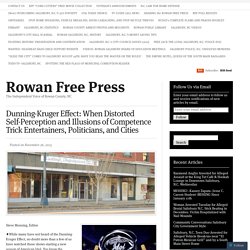
You know the ones where people, with no talent or skill at singing, grab center stage and draw eye-rolls and muted chuckles from the judges. Surely we’ve seen wannabe politicians become baffled when someone questions them about a major issue. Even some municipalities are said to suffer from inflated self-perception. The Dunning-Kruger Effect is the extreme bias that some untalented and unskilled persons suffer from when they rate their ability at a much higher level than it actually is. Back in 1999 David Dunning and Justin Kruger tested the Dunning-Kruger Effect in a series of experiments at Cornell University.
. • Tend to overestimate their own level of skill. • Tend to recognize the extremity of their inadequacy. • Fail to recognize genuine skill in others. Scholars Turn Their Attention to Attention. Imagine that driving across town, you've fallen into a reverie, meditating on lost loves or calculating your next tax payments.
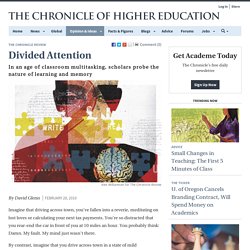
You're so distracted that you rear-end the car in front of you at 10 miles an hour. You probably think: Damn. My fault. My mind just wasn't there. By contrast, imagine that you drive across town in a state of mild exhilaration, multitasking on your way to a sales meeting. That illusion of competence is one of the things that worry scholars who study attention, cognition, and the classroom. "Heavy multitaskers are often extremely confident in their abilities," says Clifford I. Indeed, last summer Nass and two colleagues published a study that found that self-described multitaskers performed much worse on cognitive and memory tasks that involved distraction than did people who said they preferred to focus on single tasks.
Experiments like that one have added fuel to the perpetual debate about whether laptops should be allowed in classrooms. Wait a minute. The 30 Second Habit That Can Have a Big Impact On Your Life There are no quick fixes.
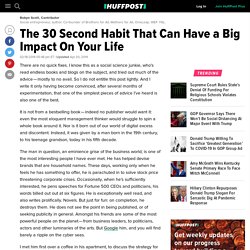
I know this as a social science junkie, who’s read endless books and blogs on the subject, and tried out much of the advice — mostly to no avail. So I do not entitle this post lightly. And I write it only having become convinced, after several months of experimentation, that one of the simplest pieces of advice I’ve heard is also one of the best. It is not from a bestselling book — indeed no publisher would want it: even the most eloquent management thinker would struggle to spin a whole book around it. 10 Rules of Good Studying.
Reference articles. Explore the Brain and Mind - BrainFacts.org. Learning How to Learn: Powerful mental tools to help you master tough subjects. Bruce Mangan, PhD: Cognition, Fringe Consciousness + Convergent Phenomenology. Bruce Mangan, PhD received an interdisciplinary PhD in Cognitive Science and Aesthetics from the University of California, Berkeley, in 1991.
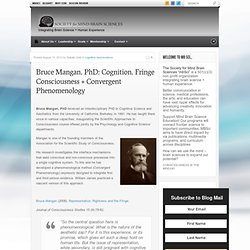
He has taught there since in various capacities, inaugurating the Scientific Approaches to Consciousness course offered jointly by the Psychology and Cognitive Science departments. Mangan is one of the founding members of the Association for the Scientific Study of Consciousness. His research investigates the interface mechanisms that weld conscious and non-conscious processes into a single cognitive system. To this end he has developed a phenomenological method (Convergent Phenomenology) expressly designed to integrate first and third person evidence.
William James practiced a nascent version of this approach. Bruce Mangan (2008). Journal of Consciousness Studies 15 (9):75-82. Blogs, Articles and Videos from the World's Top Thinkers and Leaders. Inquiring Minds Podcast’s stream. Annie Murphy Paul. Study Hacks - Decoding Patterns of Success - Cal Newport. On Sam Harris and Stephen Fry’s Meditation Debate February 19th, 2019 · 44 comments A few weeks ago, on his podcast, Sam Harris interviewed the actor and comedian Stephen Fry.
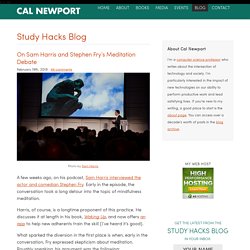
Early in the episode, the conversation took a long detour into the topic of mindfulness meditation. Harris, of course, is a longtime proponent of this practice. He discusses it at length in his book, Waking Up, and now offers an app to help new adherents train the skill (I’ve heard it’s good). What sparked the diversion in the first place is when, early in the conversation, Fry expressed skepticism about meditation. Harris’s response was to compare meditation to reading.
Scott H Young. Writing tips and tricks from the Publication Coach - Daphne Gray-Grant. Career Advice, Education Advice, Life Advice by Marty Nemko. Fluent in 3 months – Language Hacking and Travel Tips — Unconventional language hacking tips from Benny the Irish polyglot; travelling the world to learn languages to fluency and beyond!